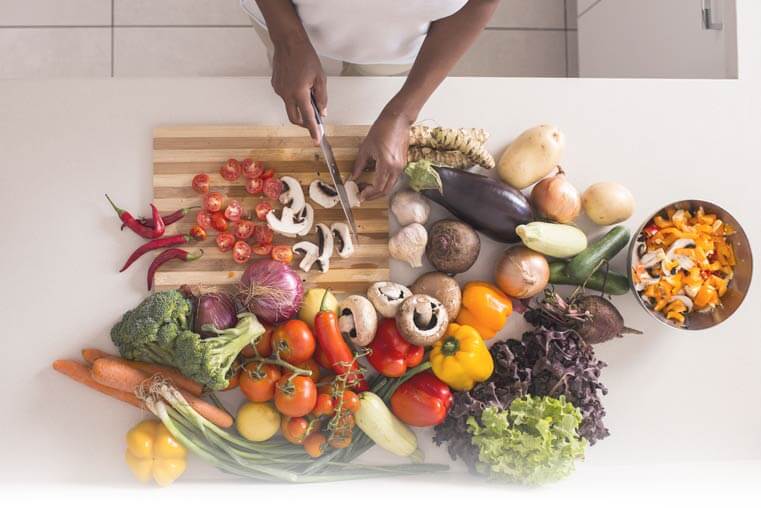A woman’s period is known for bringing discomfort. Whether it be bloating, irritability, fatigue, or brain fog, 80 percent of women experience symptoms during their monthly cycle. Naturally, many of these symptoms are caused by the hormone changes occurring in the body during this time. So are you doomed to discomfort every month?
Maybe not. There are dietary contributors to many of the period symptoms women experience. Avoiding certain foods and embracing others can help you to control your period symptoms and alleviate some of the discomfort you feel during your period. Here are 11 of the most common problems women report during their period, and ways in which diet can help.
Anxiety and Irritability
Many women report increased feelings of anxiety or irritability during their periods. These feelings can make it more difficult to control one’s temper, work effectively, or interact calmly with friends and family.
The solution? Cut out the caffeine. Caffeine is a stimulant that can increase irritability and anxiety all on its own. When you are having your period, cutting back on caffeine consumption (In the form of coffee, tea, or other drinks) can help to regulate your central nervous system and help you feel calmer.
Mood Swings and Melancholy
Mood swings are another well-known period problem. If you feel yourself going from calm to crying or happy to mad in a matter of moments, you may have your period to blame.
The solution? First, avoid alcohol. As a depressant, alcohol will amplify any negative feelings you are already experiencing.
Second, eat foods rich in an amino acid called tryptophan. Tryptophan becomes serotonin in the brain, and serotonin helps to stabilize your moods. Here is a list of foods rich in tryptophan that also make tasty and healthy snacks or meals:
- Nuts
- Chia seeds
- Pumpkin seeds (which also contain zinc, a depression-fighting nutrient)2
- Eggs
- Poultry
- Oats
- Fish (i.e. Tuna and salmon)
To get the most out of your tryptophan, eat vitamin-D rich foods along with it. Vitamin D helps to convert the tryptophan into serotonin. Salmon contains both nutrients together, if you want to get the most benefit out of your meals.
Sleepiness and Fatigue
Your usually energetic self may be left feeling like an afternoon nap (or having trouble waking up in the morning) while you are having your period.
The solution? Space out your meals to control your blood sugar and avoid fatigue-inducing carb overloads. In particular, eat many smaller meals throughout the day instead of a few larger meals. In addition, focus on protein-rich foods, whose complex carbs and fats will further stabilize your blood sugar and your energy levels.
Food Cravings
What do you crave during your period? Chocolate? Potato chips? A greasy burger? Most women know all about food cravings, and the unhealthy foods they make us want to consume.
The solution? Give in to your food cravings—Just choose healthier versions of the unhealthy stuff. For example, try baked sweet potato fries instead of french fries, or dark chocolate (which contains serotonin) instead of candy.
In addition, hold off the food cravings by eating those more frequent small meals mentioned above. When you are full, you will be less likely to dream about your favorite unhealthy craving, and it will make it easier to choose a healthy food to consume the next time a craving hits.
Insomnia
Do you spend your period staring at the ceiling during the wee hours of the morning? Insomnia can strike during that time of month, making your irritability and fatigue much worse.
The solution? Consume foods rich in melatonin, a hormone that can help to regulate sleep cycles. For example, tart cherry juice, which contains melatonin, has been proven to help people sleep better.
Tackle those tryptophan-rich foods again, too. Melatonin comes from tryptophan, so eating an evening snack containing one or more of the foods listed in #2 above can actually improve your melatonin levels, and your sleep.
Acne
Acne can be an embarrassing and frustrating visitor during your period. While hormone fluctuations bring on the acne, certain foods can help to alleviate it.
In particular, water can reduce the amount of acne you experience. Its benefits include hydration, skin moisturization, and the flushing of toxins from your body.
In addition, fight acne by avoiding sugar, refined carbs (such as white pasta), and dairy. Each of these foods tends to worsen, instead of improve, acne.
Upset Stomach.
Feeling nauseated or unsettled in your stomach can make all food sound unappealing. And, it can interfere with your daily activities and work.
The solution? Drink decaffeinated teas known for their soothing properties. Here is a list of some of the best:
- Ginger
- Mint
- Chamomile
- Peppermint (Which can also ease cramping)
Constipation and Diarrhea
Whether you are going too much or not enough, bathroom troubles during your period can be uncomfortable.
The solution for diarrhea? Consume foods rich in soluble fiber. This type of fiber absorbs the fluid in your body that can make diarrhea worse. Here is a list of some soluble fiber-rich foods:
- Oats
- Sweet potatoes (skins off)
- Chia seeds
- Bananas
You can also drink unsweetened coconut water to help replace electrolytes lost by frequent diarrhea.
To help with constipation, focus on eating insoluble fiber. Here are foods rich in insoluble fiber:
- Whole grains
- Nuts
- Seeds
- Fruits (with skin)
You can also fight constipation by drinking ½ cup to 1 cup of prune juice in the morning. Prune juice serves as a natural laxative that can encourage bowl movements.
Whether you suffer from diarrhea or constipation, also make sure to drink at least 8 cups of water a day to keep your body hydrated, balanced, and moving things along.
Gassiness
Feeling bloated and gaseous can be embarrassing and uncomfortable. Unfortunately, it is also very common during that time of month.
The solution? Avoid foods known to increase gassiness. Here are a few:
- Broccoli
- Kale
- Cabbage
- Beans
- Dairy
- Sugar
- Salty foods
- Carbonated beverages
In addition, keep drinking water. Staying hydrated prevents your body from retaining fluids that can make you feel bloated. You should also eat foods that are rich in potassium to keep the bloat away. Here are a few:
- Bananas
- Sweet potatoes
- Watermelon
- Butternut squash
Muscle Pain
Muscle pain (most commonly cramping and back discomfort) also often accompany one’s period.
This pain can make it hard to get comfortable, work, or enjoy activities.
The solution? Eat magnesium rich foods. The magnesium can help to relax your muscles. Here are a few foods that have lots of magnesium:
- Nuts
- Seeds
- Fish
- Bananas
- Peas
- Avocados
- Dark chocolate
Brain Fog
If you find yourself more forgetful or less organized during your period, you are not alone. Many women experience brain fog during their monthly cycles. To help “clear the fog,: even during your period, be sure to eat:
- A breakfast rich in protein
- Breakfast within an hour of waking up
- Foods rich in omega-3, magnesium, Vitamin E, Vitamin D, Vitamin C, and Vitamin B.
These include walnuts; pumpkin and hemp seeds; avocados; eggs; sweet potatoes; fruits like oranges, bananas, and berries; oats; and plant milks fortified with vitamin D.
For symptom relief, contact Viva Eve
Period symptoms are a fact of life. However, you can help to ease them with the right diet. If your symptoms do get very bad, or worsen, ask your doctor for a check up. There could be an underlying condition, such as uterine fibroids or adenomyosis. You can also meet with a dietitian to get a meal plan that might help.
The doctors at Viva Eve have years of experience in the treatment of both fibroids and adenomyosis. We’re committed to providing high-quality, personalized care for each and every patient we see. Specialists in the minimally-invasive uterine fibroid embolization (UFE), we’ll partner with you to determine the best way to treat your problematic symptoms.
Sources for information referenced in this post
- Lang, U. E., Beglinger, C., Schweinfurth, N., et al. (2015). Nutritional aspects of depression. Cell Physiol Biochem, Sep; 37(3): 1029-1043.
- Howatson, G., Bell, P. G., Tallent, J., et al. (2012). Effect of tart cherry juice (Prunus cerasus) on melatonin levels and enhanced sleep quality. Eur J Nutr, Dec; 51(8): 909-916.
- Cleveland Clinic. (2014). Retrieved from Nutrition Problems & Their Solutions.
The information in this post is informational only and not intended to provide medical advice or as a replacement for the services of a physician or professional treatment.



